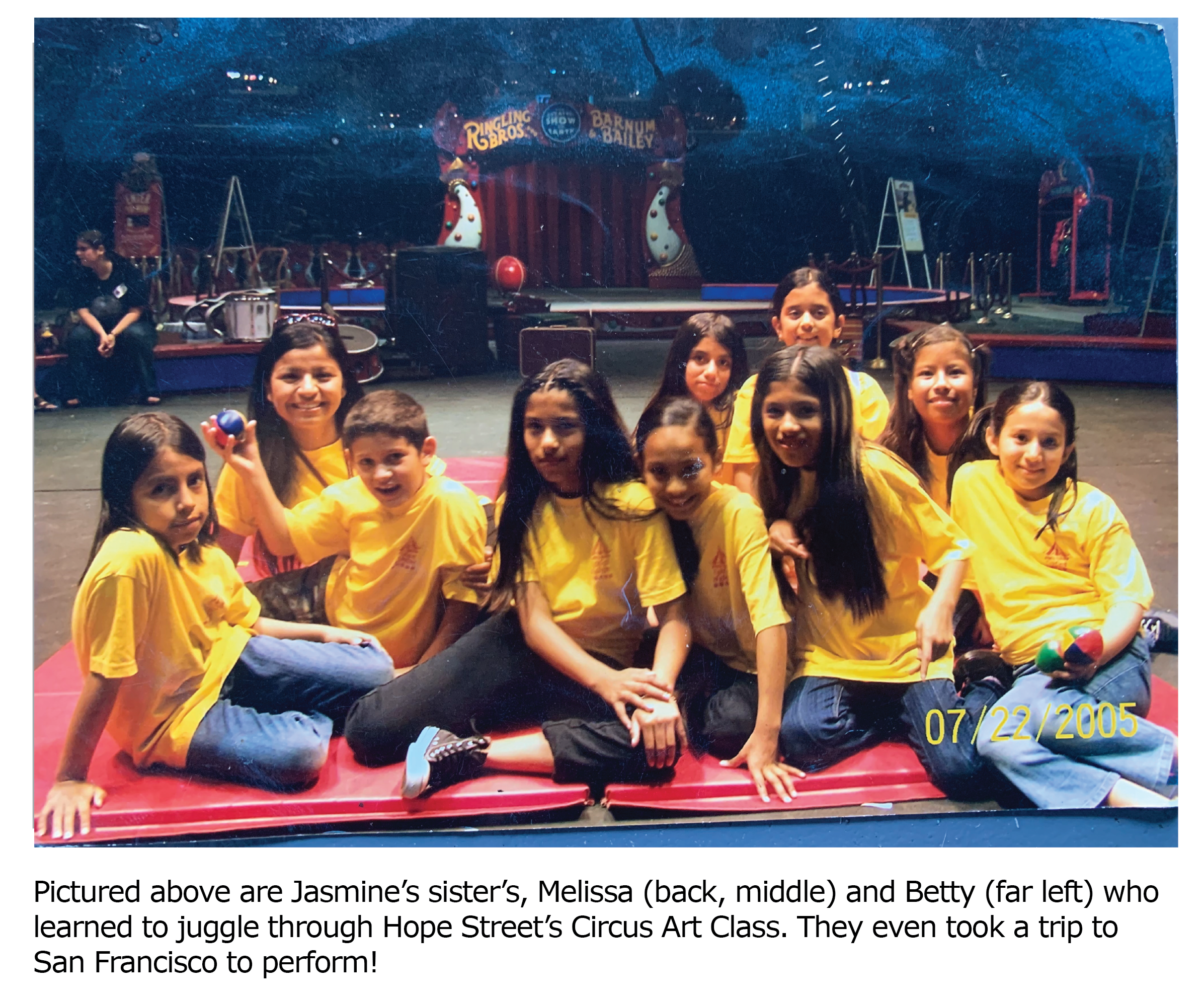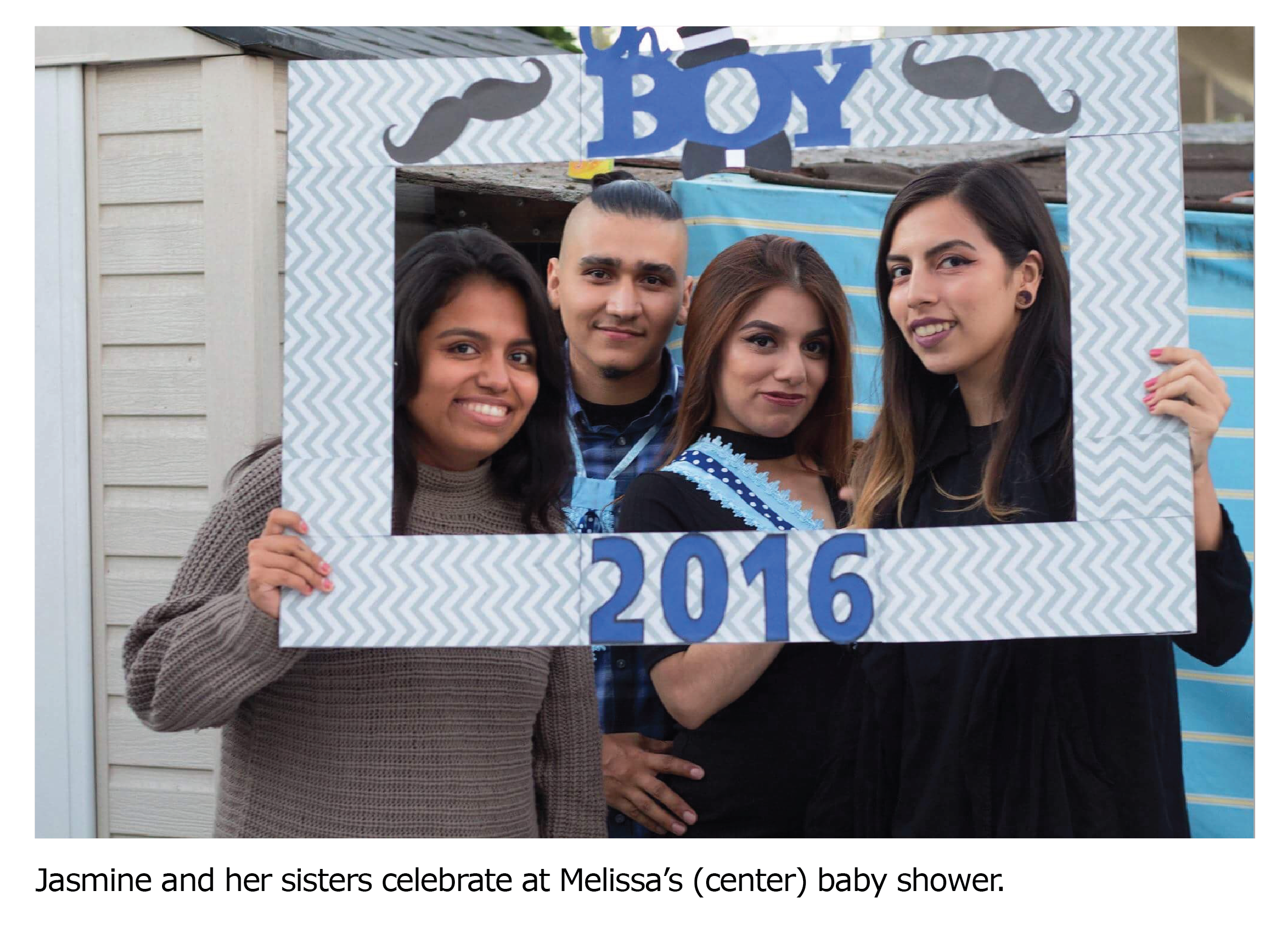|
Jasmine arrived at Hope Street in 1999 as an eight-year-old and only left when she graduated from high school. In those early days, Hope Street was located in Leavey Hall on the hospital campus and was already well known in our neighborhood. Jasmine explains, “…it was a rite of passage; everyone wanted to go as soon as they were able to because it was a very fun and safe place.” On her first day, she was welcomed into the After-school Program by Sid Oxford (who is still with us!) and Xochitl Alvizo. Jasmine remembers “desperately wanting to stay that very day.”
 She has many memories of Hope Street but there is one that sticks out: She has many memories of Hope Street but there is one that sticks out:
“Kids were encouraged to read as much as they could and were given access to the small but diverse collection of books the program had. They were color-coded by level of difficulty, and we would be tested on our reading comprehension skills. I’ve always had a love for books and am a bit competitive, so all I longed for was to be able to read the most difficult books available. I was only in 6th grade, but I remember being tested by Sid, and when he revealed to me that I was reading at a high school level, I was ecstatic! I was extremely proud of myself and excited to finally have access to more books. I then decided to borrow my first “difficult” book. As I was browsing, “Night” by Elie Wiesel caught my eye. It was one of the fastest books I had ever read, and it prompted me to learn about the Holocaust on my own. My love for history really started then, and I am grateful to have had access to Hope Street's library when I wasn’t old enough to walk to the library on my own. Thanks to Hope Street my curious mind had a place that gave it the opportunity to learn.”
When asked about the impact of Hope Street on her life, she says, “It is hard to encompass in mere words all that Hope Street has done not only for me and my two younger sisters, Melissa and Betty, but countless other kids that came from similar backgrounds. My parents never had to worry about my safety after school. They knew where I was at all times and the kinds of activities I was involved in. This was a great relief to a lot of the parents in our neighborhood since many of them had to constantly work to make ends meet. I was able to build everlasting friendships with both kids from my neighborhood and mentors at Hope Street. To this day, my friends and I speak about Hope Street with the fondest love and respect. It was here that troubles would go away, that we could compete in a healthy environment, take field trips to places we otherwise couldn’t afford, and meet people that we could aspire to become. Hope Street gave all of us the opportunity to dream and be better people, so I am forever grateful.”
 Jasmine went on to attend the University of California, Irvine and majored in English with a minor in History. She was the first in her family to attend and graduate from college. While she is proud to have earned a Bachelor’s degree, college was not easy. Living on campus was financially prohibitive so she had to commute from LA and at times, she felt intimidated to be one of the few Latina students in the English program and the university. However, this pushed her even more to graduate. She wanted to earn a college degree not only for herself but for her family. Jasmine is 29 and works for the Los Angeles Superior Court’s Human Resources department. She chose HR because she's always considered herself a people person and knew that she wanted to work in the public sector. Working in HR gives Jasmine the opportunity to meet people from all walks of life while also nurturing her analytical side. Jasmine went on to attend the University of California, Irvine and majored in English with a minor in History. She was the first in her family to attend and graduate from college. While she is proud to have earned a Bachelor’s degree, college was not easy. Living on campus was financially prohibitive so she had to commute from LA and at times, she felt intimidated to be one of the few Latina students in the English program and the university. However, this pushed her even more to graduate. She wanted to earn a college degree not only for herself but for her family. Jasmine is 29 and works for the Los Angeles Superior Court’s Human Resources department. She chose HR because she's always considered herself a people person and knew that she wanted to work in the public sector. Working in HR gives Jasmine the opportunity to meet people from all walks of life while also nurturing her analytical side.  Her sisters also attended Hope Street throughout their elementary, middle, and high school years. Melissa, 27, is applying to various University of California art programs. Betty, 25, is taking online courses for computer programming and coding and has goals of joining the tech field. Jasmine is immensely proud of them. Her sisters also attended Hope Street throughout their elementary, middle, and high school years. Melissa, 27, is applying to various University of California art programs. Betty, 25, is taking online courses for computer programming and coding and has goals of joining the tech field. Jasmine is immensely proud of them.
|